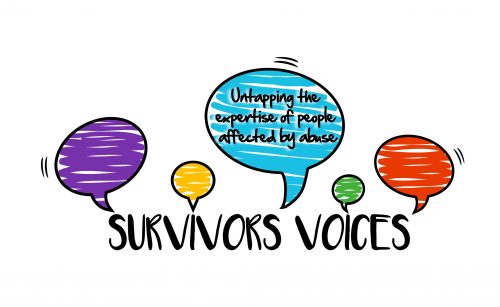 On 31st October 2018 we attended a national research event at St.Thomas’ Hospital in London, hosted by King’s College and the London Havens, to launch our pilot publication Turning Pain into Power: A Charter for Organisations Engaging Abuse Survivors in Projects, Research and Service Development. Here are 5 reasons why we hope to inspire everyone who supports people who have experienced abuse, to read and use it.
On 31st October 2018 we attended a national research event at St.Thomas’ Hospital in London, hosted by King’s College and the London Havens, to launch our pilot publication Turning Pain into Power: A Charter for Organisations Engaging Abuse Survivors in Projects, Research and Service Development. Here are 5 reasons why we hope to inspire everyone who supports people who have experienced abuse, to read and use it.
1. It was written by survivors. While many researchers, clinicians and practitioners have studied the effects of abuse and trauma and approaches to recovery, few studies have asked survivors for their views. Even rarer are studies designed and undertaken by people with experience of abuse. Yet the lens of lived experience brings a level of insight and empathetic understanding which an observer or witness can never completely share. Our charter is the real deal. It is the collective wisdom of a community of survivors that have travelled 18 years together and brings the ultimate litmus test of experience to any engagement with survivors.

2. It is vital to be trauma-informed. Being trauma-informed is not just for those working in mental health. There are now global moves to get all organisations to acknowledge the centrality of trauma in human life and how this affects people in our midst – whatever type of organisation or service we run – and how trauma impacts our relationships and organisational systems – from workplaces, to schools, to cultural, community and religious institutions. More specifically within mental health settings, a trauma-informed approach is often summarised as the move from considering “What’s wrong with you?” to asking “What happened to you?” Angela Sweeney et. al. (2018) recently published a seminal paper (A paradigm shift: relation ships in trauma-informed mental health services) that explains the trauma-informed approach and why it works, drawing on the latest research and survivors’ experiences. They write that “Trauma-informed practices strive to achieve mutual and collaborative relationships between staff and [survivors] through partnership working.” We believe such collaborative relationships are essential. Our charter will help you to develop those relationships and your trauma-informed practice.

3. Survivor engagement isn’t easy. As people who have experienced abuse, we had distorted and toxic relationships imposed on us by people who had significance, power and influence in our lives (abusers.) We may find it hard to trust, to speak, to break the silence of abuse. We can understandably be frightened of attachment and push people away. We will fluctuate in our mental and physical well-being and capacity. We pick up every nuance of threat or lack of emotional safety and are easily triggered into flight/fight/freeze/appease responses. The coping strategies we adopted to survive can often be ‘negative’ ones (self-harm, alcohol or drug abuse) but have been essential to get us through trauma. Our charter will help you to understand these not as barriers to good engagement, but as vital coping skills that with warm, caring collaboration can be transformed and overcome.

4. Good engagement helps recovery. And the reverse is also true, poor engagement hinders it. We have been observing and collecting evidence of this for 17 years at our survivor gatherings, seminars and training events. Our most recent research used our innovative and creative River of Recovery model to capture survivors’ experiences of the helps and hindrances to recovery. In our Charter we adopted Ofsted’s approach of defining good and poor engagement to help explain what good engagement might look like in practice, based on our research findings.

5. There are clear and simple actions we can take to practise good engagement. It may involve self-awareness and personal or organisational change. With the right intention, a commitment to engage well and an attitude of care and respect, anyone can do these. We define seven principles for good engagement in our charter and provide practical guidance for seven areas of good practice. We are confident that if you follow all of these, you will have amazing engagement! Just one simple change – for example, ensuring it is survivors who decide whether or not they have capacity to take part in a project, treatment or event- can make a big difference. To be honest, we limited ourselves to seven to fit neatly on the page. We have lots more lived-experience-tested ideas to share, and welcome invitations to come and share these with you and your team or organisation. Look out for the training and resource materials to support the Charter that we will develop as part of the pilot.
So we hope you will not just read our charter but share it and use it as a tool to to develop good engagement. If you are a survivor, it may help you to identify and negotiate the relationships you want with supporters and services on your road to recovery. As a professional, you can use it to plan, evaluate and develop your engagement (at individual, team or organisational levels) with people who have experienced abuse, both those you know about and those yet to identify themselves as survivors.
We are keen to learn and report on how the Charter is used and what impact it has, so please let us know what your experience is.
Bibliography:
Turning Pain into Power: A Charter for Organisations Engaging Abuse Survivors in Projects, Research and Service Development, Survivors Voices 2018
Sweeney, A., Filson, B., Kennedy, A., Collinson, L., & Gillard, S. (2018). A paradigm shift: Relationships in trauma-informed mental health services. BJPsych Advances, 24(5), 319-333. doi:10.1192/bja.2018.29

